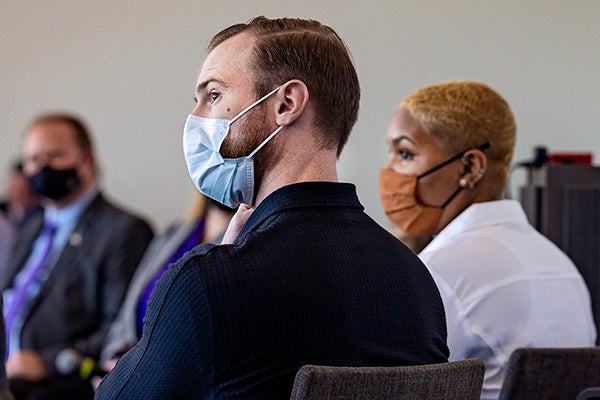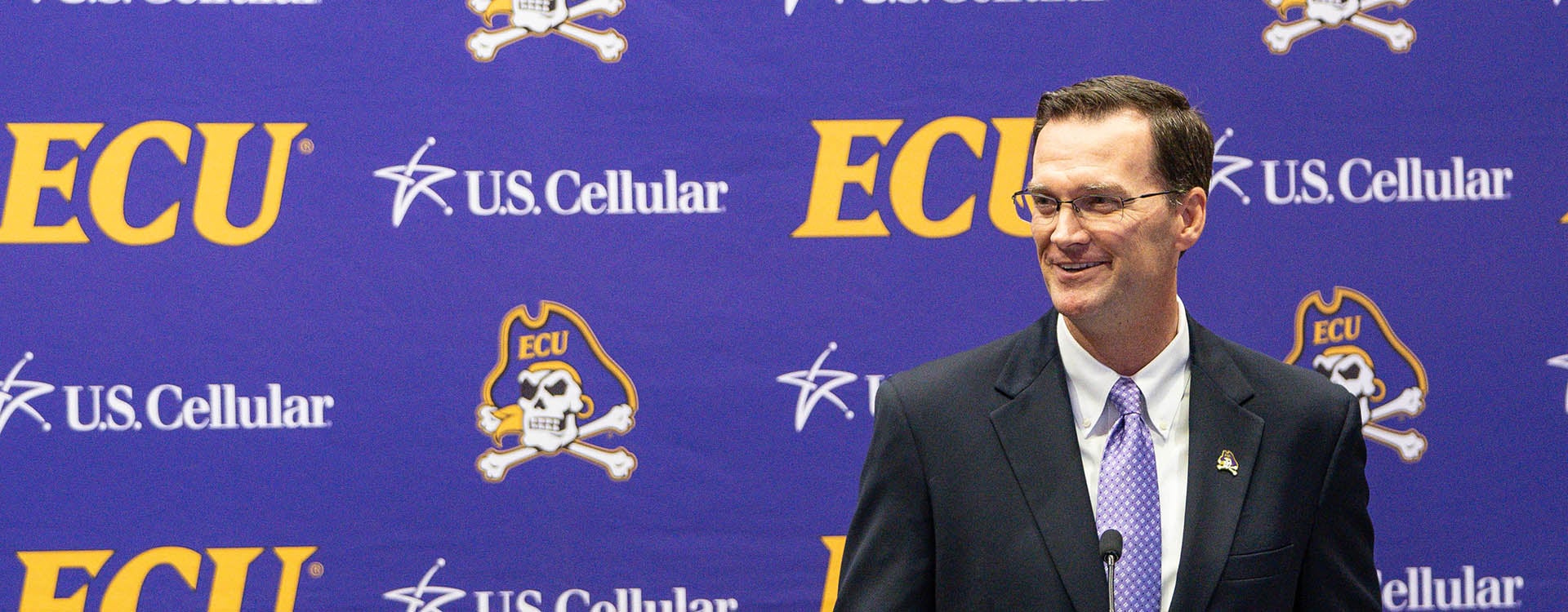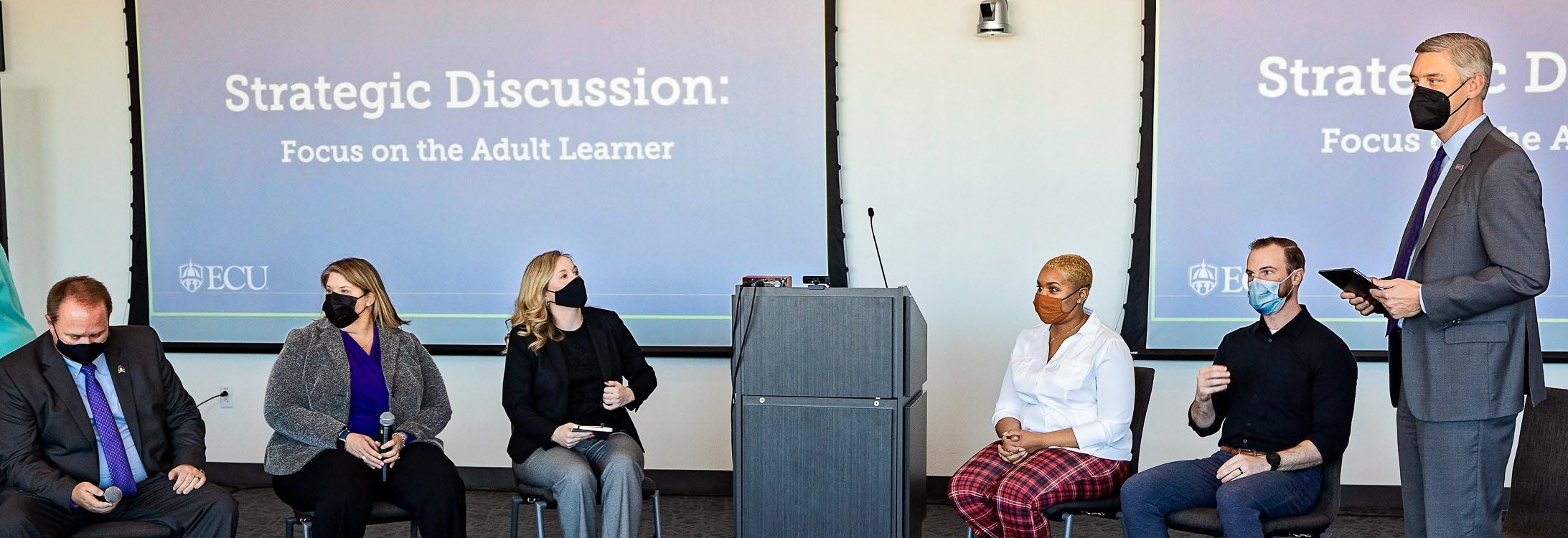SUPPORTING ADULT LEARNERS
ECU looks to expand services to more non-traditional students
East Carolina University is poised to build on its success of educating non-traditional students with a focus on expanding support and options for adult learners.

Cory Page (left) and Lindsey Richardson discuss their experiences as non-traditional students at ECU.
Chancellor Philip Rogers hosted a strategic discussion on adult learners with the ECU Board of Trustees, which met Thursday and Friday in the Main Campus Student Center.
Rogers stressed the importance of adult learners to ECU and the contributions they make to the university as a whole. He cited statistics that show almost 60% of enrolled undergraduates across the nation are considered non-traditional students, many of whom care for dependents, work full time while enrolled, or are connected to the military.
The shift is just one in the changing landscape of U.S. higher education, requiring ECU to position itself to respond to emerging challenges, he said.
“We’ve talked often as a board and a university about how higher education is evolving before our very eyes,” Rogers said. “That change was not unpredictable, and it’s taking many forms: technology-enabled change; budget pressures; mental health; social and political dynamics; and one developing trend that often hits home the hardest is the dramatic demographic shift in our country driving unprecedented enrollment impacts.”
ECU is working aggressively to offset forecasted enrollment declines by making strategic financial investments in three high-demand academic programs this year — criminal justice, nursing and educational leadership. The university is also investing in digital tools to enhance yield and grow highly-sought online programs to capture new student markets. Finally, similar efforts are underway to develop industry-desired credential programs that will support learners of all stages of life, Rogers said.
“That is just the tip of the iceberg,” he said. “But perhaps even more important than what I’ve just shared is an understanding that higher ed itself is changing the narrative around where our focus and energy should really be aimed — which is toward a value-based, return on investment, demonstration of a relentless pursuit of student success.”
During the Thursday panel, Rogers said enhancing the pathways to the university can create seamless transitions for adult learners who can transform not only their lives but the entire region through the career changes or job advancement that an ECU education can bring them.

Mike Van Scott, interim vice chancellor for Research, Economic Development and Engagement takes notes during the BOT meeting.
Student Lindsey Richardson attended community colleges and ECU early in her academic career.
“Life happens,” she said, noting the birth of two children and caring for a parent. She’s back at ECU after a five-year absence and is set to graduate this summer with a degree in university studies.
“This is my time,” she said, adding she “wants a career, not just a job.”
Cory Page came to ECU with credits from four colleges and experience as a hospital corpsman and paramedic after his years in the Marine Corps. His goal is to become a physician assistant and he cited the support and education he has received from professors.
“I love everything about this campus,” he said.
The panel discussion focused on available resources at ECU, such as Student Veteran Services, as well as potential barriers for adult learners, such as a lack of flexible class scheduling options and child daycare.
Also Thursday, trustees learned more about a UNC System strategic initiative — Project Kitty Hawk — aimed at addressing the needs of North Carolina’s adult learners through distance education. Rogers is one of three chancellors named to the planning board for the project, which is expected to go live in two to three years.
Project Kitty Hawk is one of three key system initiatives that will impact ECU. The others are strategic planning and a new proposed funding formula for all UNC System schools. The formula would encourage performance and student success over its current focus on enrollment growth. More details are expected at the next ECU Board of Trustees meeting April 28-29.
Following a closed session during Friday’s full board meeting, trustees unanimously approved:
- Naming the Maker’s Lab in the Isley Innovation Hub at ECU in memory of former trustee and alumnus Sam Wornom. At the beginning of the meeting, board chairman Scott Shook presented a resolution honoring Wornom, which was adopted by the board;
- An employment contract for Director of Athletics Jon Gilbert;
- Naming Linda Kean as dean of the College of Fine Arts and Communication effective July 1.
Also Friday, the board approved by consent agenda:
- Establishing the Spangler Distinguished Professor of Early Child Literacy in the College of Education. UNC Board of Governors member Anna Spangler Nelson created the professorship with a $2 million donation from the Spangler Foundation, which is eligible for the state match on professorships. The professorship will support a professor to teach and provide leadership in the training of future literacy faculty to ensure reading proficiency in children in North Carolina. ECU is one of four universities awarded funds in the UNC system.
- Naming the Golden Leaf Foundation First Floor of the Life Sciences and Biotechnology Building, along with the Dr. and Mrs. Douglas Privette Meeting Room in the same building.
- Revisions to the employment-related background checks and criminal activity reporting policy and a change that allows in-state tuition for athletic scholarships.
- Revisions to the university’s faculty manual and patent policy.
During committee meetings Thursday:
- Gilbert reported to the Athletics and Advancement Committee that baseball season tickets sold out for the first time and that football anticipates selling out season tickets in TowneBank Tower. He also said the department’s new partnership with Playfly Sports as its exclusive multimedia rights holder begins July 1 and that construction has started on an auxiliary weight room near the baseball stadium. Vice Chancellor for University Advancement Chris Dyba provided a fiscal year fundraising update. He reported that overall fundraising is $16 million ahead of projections. He also reported that the university’s comprehensive campaign has raised $383 million of its $500 million goal.
- Bill Bagnell, associate vice chancellor of campus operations, presented to the Finance and Facilities Committee on building conditions and the capital planning process for campus. ECU has 7.65 million gross square feet of space and 220 buildings.
- Mike Waldrum, dean of the Brody School of Medicine and CEO of Vidant Health, updated the Health Sciences Committee on the status of the ECU Health rebranding efforts. Waldrum said the new logo and branding should be unveiled in late spring. He also updated the committee on the progress and timeline for the planning and construction of the new medical education building on ECU’s Health Sciences Campus. Waldrum said the exact location for the new building is still being discussed and that the entire process should take four to five years before the building opens to students.
- Audit, Risk Management, Compliance and Ethics Committee members were informed that a university-wide code of conduct to cover all employees from the chancellor to student workers and approved volunteers is in review and could be ready for approval by April.

ECU Athletic Director Jon Gilbert will continue in his position after the university’s Board of Trustees approved a five-year contract
